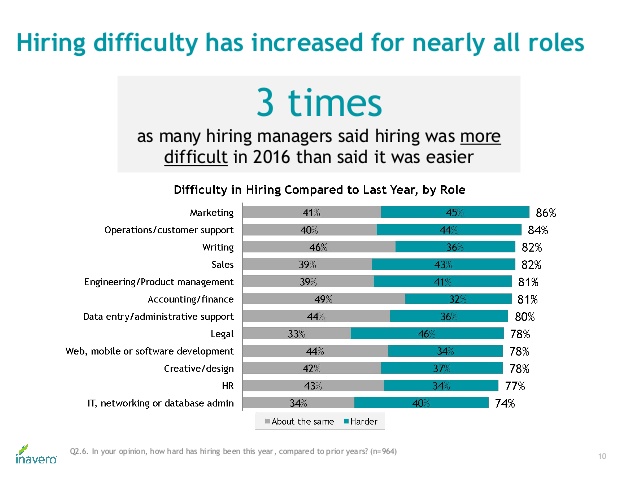
5 pieces of sales recruiting advice you should ignore.
When you’re ready to hire a salesperson, chances are you’ll look to your network first for recruiting advice or to find the right person.
This makes total sense. There are a lot of people who have built sales teams successfully and have the experience to draw on.
However, I have to warn you – there are some bad pieces of advice that often get floated around out there which will cost you more than they will help you.
Here are the most common pieces of bad advice I hear… and what you should do instead.
1. “Don’t hire the first person you love… see who else is out there.”
FOMO during the recruiting process is a very real thing for startup leaders (myself included). So much so, that when we get a talented person in front of us who we like, we still tell ourselves:
“What if there’s someone better out there?”
However, here’s the thing – since unemployment is at an all-time low and the market for sales talent is more competitive than it ever has been, there’s no room for this.

From a recent study by Upwork and Inavero on The Future of Work.
In fact, the fear of missing out should go the other way – we should be more afraid of losing them than we should be of hiring someone too quickly.
What to do instead.
When you find a salesperson you like who has the skills/track record you need to do the job well, don’t hesitate… hire them. They are not a dime a dozen in today’s market!
2. “Hire a salesperson on commission only” or “Try before you buy”
The thing about salespeople that I see founders forget most often is that they are literally the face of the company.
That means whatever your salesperson does is pretty much what your buyers will think of the company, good or bad.
Do you really want to leave that up to someone who isn’t 100% committed to your business?
Furthermore, as the data is showing, we’re in a fiercely competitive market, it’s easy for a top seller to find a different opportunity that’s willing to take the risk and hire them full time.
And what happens when they leave?
The relationship they built with your customers is gone and you have to start over again. Which is very costly on a number of levels.
What to do instead.
Same as point #1 above. Find someone who has the skills and experience to do the job and do it well… and then hire them!
3. “Cut candidates if they fail your assessment or presentation.”
I’ve seen a lot of businesses who make candidates go through an assessment or a presentation (or both) as a black and white pass/fail test.
Sometimes even before they talk to a single human being at the company!
This is a really bad idea. Assessments tell you a lot about a salesperson’s aptitude… but they don’t tell the whole story.
For instance, one of our clients interviewed a candidate we brought their way and she totally bombed the presentation.
They hired her anyway because she showed the right raw ingredients for success.
She is now their top performer – at 120%+ of her quota, managing 80+ opportunities at one time!
How to use assessments and presentations effectively.
The best way to use an assessment or presentation is as a single data point in the process.
Think of it as a great opportunity to collaborate inside of the process. And also something you can onboard from to confirm/deny what the proper course of action should be.
But not the end all and be all.
Here’s a great example of a VP that approaches and grades mock sales presentations the right way (including what he looks for to ensure they will be successful in his organization):
4. “Hedge your bets by pitting recruiters against each other and work them down to 15%.”
The truth is, sales candidates pay just as much attention to how you recruit them as they do to what you sell or why you’re hiring.
But here’s a dirty little secret about the recruiting industry… not all recruiting processes are created equal.
There is a big difference in candidate experience between a recruiting firm that relies on posting jobs and collecting applications and one that engages passive top performers one on one.
Here’s the thing – most who recruiters who join the race to the finish line for a shot at 15% commission are in the first bucket.
There just isn’t enough time to spend on a quality-focused, passive recruiting process when they’re rushing to get resumes in front of you and beat out the competition.
Furthermore, this spray and pray recruiting tends to turn top performers off completely – to the point where you never have an opportunity to engage with them.
So it may be cheap… but what are you really paying for?
Dig into their recruiting process.
Everyone’s budget and needs are different.
So no matter who you work with as a recruiting partner, make sure you understand their process and what they’re really doing under the hood.
Does it create the kind of experience for your candidates that you’d want if you were in their shoes? If not, their commission rate could end up end up costing (not saving) you money.
(Deloitte estimated that turnover could cost you between 150% to 200% of annual base salary)
5. “Working exclusively with a recruiter holds your business back.”
This one actually does hold some weight. But not because of exclusivity.
Statistically speaking, exclusivity is actually a good thing for your business. There is a 94% chance of filling your role when it is in place (vs. 18% with contingent).
These are numbers I’ve heard on my recruiting mastermind calls and have been confirmed with my own process (on the exclusivity side at least).
However, exclusivity does hold your business back if the recruiter drops the ball with:
- Poor communication
- Slow results
- Lack of collaboration
- They don’t know what they’re looking for
Additionally, sometimes the way exclusivity is structured can create problems too. And all exclusivity is not created equal.
For instance, we only work exclusively on the roles agreed upon within a designated time frame to allow both parties to not be held back if it doesn’t work out (we don’t want an abusive relationship in either direction).
But many recruiters will approach exclusivity from a standpoint of locking you down on every role you have… which puts you in a tougher situation if something goes wrong.
How to make exclusivity benefit you, not hurt you.
Big picture, this is all about finding a recruiting partner who values real partnership and collaboration.
To ensure yours does, ask yourself these questions:
-
Do they take time to understand my business beyond a cursory intake meeting?
-
Do they take time to pick apart past hires and understand why they succeeded/failed?
-
Do they care about iteration and learning along the way with each candidate?
-
Are they responsive and proactive with their communication before you hire them?
-
Does their contract contain safety clauses that protect you as the client?
Insist on a “yes” to each of these if you want an exclusive arrangement that will help you, not hold you back.
Questions about the advice you’re getting?
Helping startups win at sales is my life’s work (literally, I’ve been at this for 20 years). If you have any questions about the advice you’re receiving from your network, board, or connections, my hotline is always on to talk shop!
Sales advice that works, in your inbox.
No spam, no pitches. Just real insights like these that have helped us win at sales and recruiting over the last 20 years via email each week.
